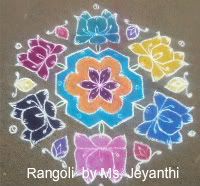Rangoli - Indian Floor Painting


Elegant patterns that have been adorning Indian homes for ages are called Rangoli in Sanskrit (meaning ‘row of colors’). Each Indian State has its own name for these floor decorations which are always made in the courtyard or outside the gate. In Tamil Nadu, South India, patterns made with rice powder or fine sand, called Kolam are drawn daily while in other parts of the country, Rangoli patterns are made on special occasions, festivals like Diwali or for weddings. Kolam is usually made only with white powder. However in the Tamil month 'Margazhi' it is a custom to put up only color Kolam or Rangoli.
Though Rangoli has its origin in religion, this practice has been passed on through each generation, making it an indelible part of Indian Culture. It is believed that Rangoli at the doorstep brings good luck. While creating these patterns, care is taken not to leave any blank spaces as these offer scope for evil forces to enter a house.
Finely ground rice powder was exclusively used in the past to make rangoli designs though now several other options are available including sand or chalk powder colored with dyes and paints. However there was a good reason to use rice powder as this provided food for ants, insects and small birds in the shelter of the home, adding a blessing to the household.
There are various alternatives to creating Rangoli patterns and at times diyas (small earthen lamp), flowers and even beads are used to decorate these floor designs. It is a common practice in India to host Rangoli contests to keep this tradition alive and encourage the younger generation to participate.
In cities where housing poses a problem, the area in front of a house is often limited or even totally absent. In such cases, stickers having Rangoli patterns are stuck on the doorstep.
Rangoli is always laid on a clean floor where dots are first placed before a pattern is created. Symbols from Hinduism, floral designs, animals, birds and a variety of themes are used to create Rangoli patterns.
The Rangoli does not stay for long at the doorstep as the activities of the day are prone to wipe away these carefully drawn patterns. Yet Indian women relentlessly come up with new patterns, day after day to brighten their homes and cling on to the rich heritage to which they belong.
Here are two books that will help you learn more.
Buy Rangoli: Discovering The Art Of Indian Decoration from Flipkart.com
Buy Rangoli Patterns from Amazon.com
This site needs an editor - click to learn more!
You Should Also Read:
Diwali - The Indian Festival of Lights
Pongal Festival - Traditions and Customs
Related Articles
Editor's Picks Articles
Top Ten Articles
Previous Features
Site Map
Content copyright © 2023 by Preena Deepak. All rights reserved.
This content was written by Preena Deepak. If you wish to use this content in any manner, you need written permission. Contact
BellaOnline Administration
for details.


